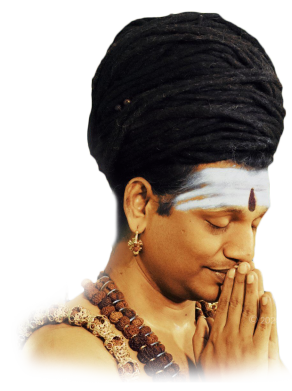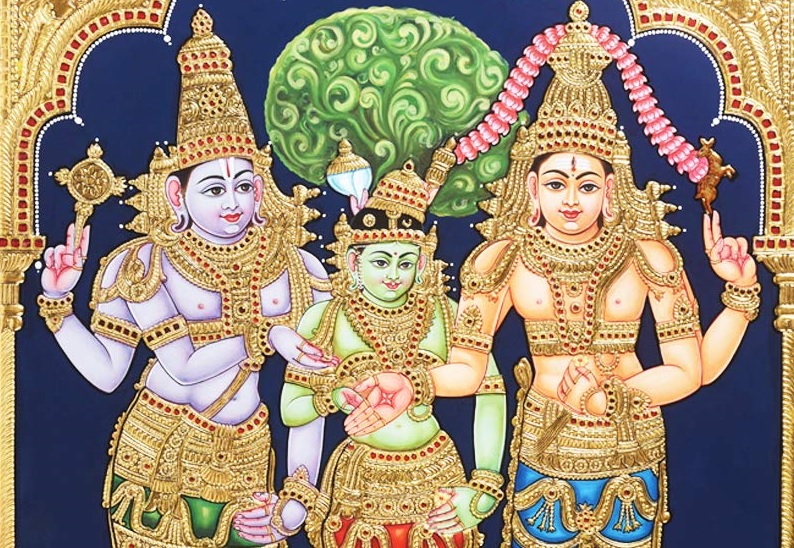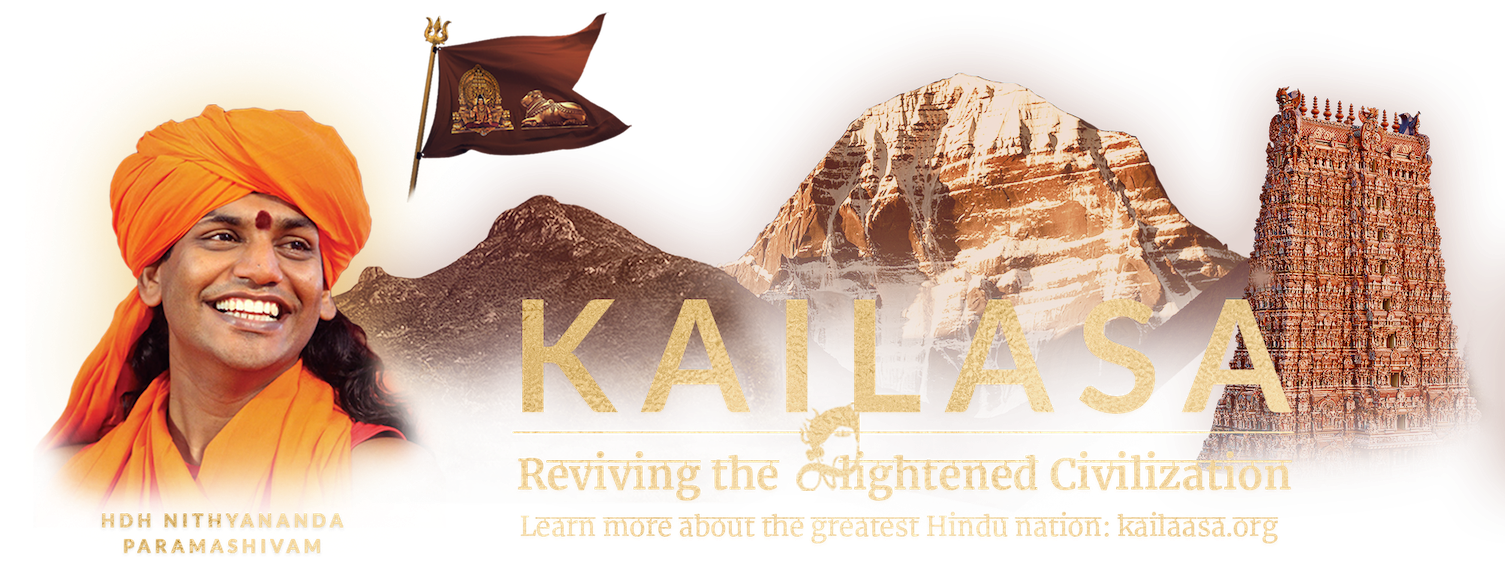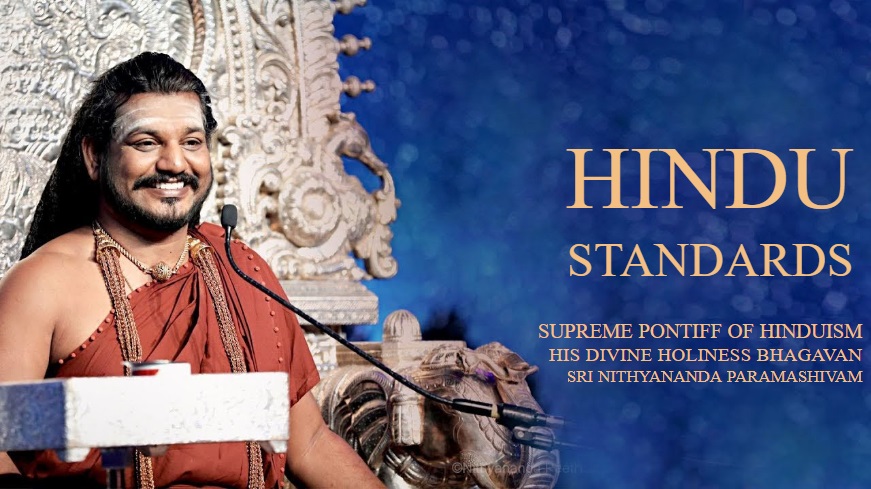Why Hindu Standards
Sanatana Hindu Dharma is not just a religion, it is a greater science. Hinduism is the most sophisticated, scientific representation of existential truths catered to every unique system of thought capable by the human mind. For the last two decades the Supreme Pontiff of Hinduism Jagatguru Mahasannidhanam His Divine Holiness Bhagavan Sri Nithyananda Paramashivam has been reviving all the aspects of Hindu tradition which give life-solutions to all problems. Furthering His mission and vision of supporting humanity with the best of what Hinduism has to offer, His Divine Holiness Bhagavan Sri Nithyananda Paramashivam has guided Hindu Compliance System (HCS) to formulate these life-solutions from the Veda-Agamas in form of user-friendly Hindu Standards.

What are Veda-Agamas?
Mahadeva’s silence is Upanishads. His words are Agamas.
- S.P.H. J.G.M. Nithyananda Paramashivam.
The Veda-Agamas are Hindu source scriptures that were revealed by Paramashiva (or Mahadeva - the primordial Hindu Divinity) Himself. As per records, they are more than 60,000 years old and their exact age is unknown. The Vedas are the pure science and the Agamas are the applied sciences in the form of Yogic science, knowledge sciences, spiritual lifestyle science, and science of rituals.
Standards from Veda-Agamas were used by 33% of humanity
For the past 10,000 years of recorded history, Hindu Standards derived from the Veda-Agamas were internationally accepted by all ancient Hindu nations (such as modern-day, India, Nepal, Indonesia, etc). These Hindu nations constituted more than 33% of entire mankind. Even today, Hindus worldwide accept the Veda-Agamas for their respective sects.
The principles given by Sadāshiva, received by Devi, adopted by Vishnu, to run this Universe is Agama
- S.P.H. J.G.M. Nithyananda Paramashivam.
In Hinduism, there are more than 10,000 Agamas. All Agamas were revealed by Paramashiva, this includes Agamas not just for Shaivism but also for all sects of Hinduism.

In Paramananda Agama (2nd chapter, Verse 7-10), Paramashiva in form of Bhairava reveals the total number of Agamas in Hinduism for all Hindu Sampradayas (Sects) as
- Vaisnava Sampradaya - 6000 Agamas
- Saiva Sampradaya - 10,000 Agamas
- Shakta Sampradaya - 100,000 Agamas
- Ganapatya Sampradaya - 1,000 Agamas
- Saura Sampradaya - 2,000 Agamas
- Bhairava Sampradaya - 7,000 Agamas
- etc.
शृण्वत्र ते भिधास्यामि तन्त्राणां गणनां प्रिये ॥
ट्सहस्राणि तन्त्राणि वैष्णवानि महेश्वरि ॥७॥
शैवानि दशसाहस्रसंख्यानि परिगण्यते ।
शतसाहस्रसंख्यानि शाक्ततन्त्राणि वै पुनः ॥८॥
गणेशस्य सहस्राणि सौराणि द्विगुणानि तु ।
मदीयानि तु तन्त्राणि सप्तसाहस्रकाणि वै ॥६॥
अन्यानि द्विसहस्राणि यक्षभूतादिसाधने ।
कानिचिद्यामलान्यत्र सिद्धान्तार्णवसंज्ञया ॥१०॥
PARAMANANDA-TANTRA,
Chapter 2, verses 7-10
Veda-Agamas provide Standards for all human pursuits
In totality, there are more than 100 trillion verses in the Agamas alone. Through these several trillions of verses, the Veda-Agamas provide elaborate guiding principles for all human pursuits in various fields, such as sociology, economics, politics, engineering, medicine, culture, performing arts, architecture, etc. A few examples are listed below:
- State Policies, Politics, and Statecraft
Samrajya Laxmi Pithika, Niti Shashtra, Artha Shashtra, Manu Smriti, etc. - Law
Dharmashastra, Manu Smriti, Parasara Smriti, Yagya Valk, Gautama, Mitakshara
Customary International law - Human Rights and International Law
Vedas
Universal Declaration of Human Rights - Banking and Accounting
Arthashashtra.
International Financial Reporting Standards - Architecture and Civil Engineering
Kamikagama, Mahaagama, and Suprabhedagama.
ICS 93.010 - Performing Arts
Pancharatra Agama
IDTS - Medicine
Charaka Saṃhitā, Sham Raj, Nighant, Bhashya Parichehed, Madhava Nidan, Vagbhat.
ISO 13485 - Surgery
Sushruta Samhita.
WHO Guidelines for Safe Surgery - Botany
Vrukshayurveda, Bruhat Samhita, Sarngadhara's Vrukshayurveda, Parasara’s Vrukshayurveda.
IAPT - Chemistry and Metallurgy
Rasahrudaya Agama, Rasendra Mangala, Rasarathnakara, Karshaputa, Lohasastra, etc.
ICS 77 - Musical Instruments
Gandharva Veda
ICS 97.200.20 - Agriculture
Krishi Parasara
UNECE - Agricultural Quality Standards - Astrology
Siddbant Shiromani, Nil Kanthi, Mahurta Chintamani, Brihat Jatak, Shighra Bodh, Parasariya - Shipbuilding
Yukti Kalpa Taru
ICS 47.020.01 - Manufacturing
Nagalingayna-Kutha, Vishvakurma-Poorana, Kumalesherra Kalikamahata.
ICS 25 - Food
Bhaga Shashtra
IFS
What is considered a Hindu Standard?
HCS compiles the trillions of verses of the Veda-Agamas into easy to apply, user-friendly documents called Hindu Standards.
Hindu Standards are repeatable, harmonized, agreed, and documented way of doing something as per Hinduism. A Hindu Standard contains technical specifications and precise criteria designed to be used consistently as a rule, guideline, or definition. Hindu Standards provide the fundamental concepts, principles for sustainable solutions for quality control & management (QCM) as per the Veda-agamas. Hindu Standards are applicable to all organizations, regardless of size, complexity, or business model.
Standards, in general, can be thought of as the collection of methods and formula that describes the best way of doing something. Hindu Standards are the best way of doing something as per Hinduism and at the same time progressing on the path of Living Enlightenment (Jeevanmukti) - the ultimate liberation while living in the body - the foremost purpose of human birth.
Discover some of the best-known and most widely-used Hindu standards.
The Hindu Compliance System is KAILASA's humble offering to Paramashiva, as a service to the world. Making the Agamas - Paramashiva's direct standards for life - available and accessible to the world in a user-friendly way, free of cost.
Jagat Guru Mahasannidhanam His Divine Holiness
Bhagavan Sri Nithyananda Paramashivam.

